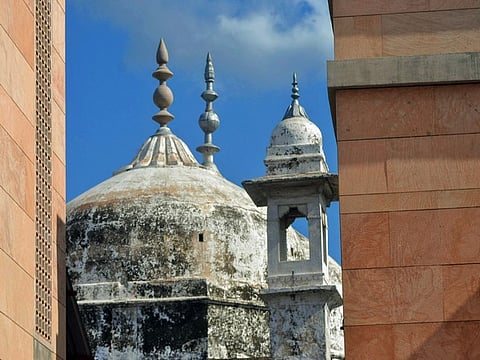

what is waqf?
Waqf is a derivation from an Arabic word which means to detain, forbid or stop. In Islamic jurisprudence it means property donated for a pious cause, expecting no material returns but only the pleasure of God. As per Waqf Act, 1995, waqf is “the permanent dedication of movable or immovable property for the purposes enshrined in islam as pious, religious, or charitable.”
The donation can be for religious institutions, mosques, graveyards, educational institutions or for charity purposes. Waqf means that the ownership of the property is now taken away from the person making waqf and transferred and detained by Allah.
Waqf in Islamic history
Though the Holy Quran has not explicitly explained the waqf, there are different verses in the book that promote charity. Islamic scriptures note that the donation of a date palm garden by Abu Talha al Ansari, one of the companions of Prophet Muhammad, was one of the early waqfs in Islamic history. The practice was prevalent in India and continued during the British period.
A person who donates should have full ownership over the property and those who receive it cannot sell it or give it as inheritance. Income from Waqfproperties can be used for numerous purposes including construction of masjids, Quran study centres, facilities for Haj and Umrah and religious propagation.
However, it cannot be used for activities that are forbidden in Islam.
Is the waqf status of a property revocable?
The property cannot be taken back from Allah. Once designated as waqf, the ownership is transferred from the waqif to Allah, making it irrevocable.
Rules currently governing waqf
While the Waqf Act, 1954, provided for centralisation of waqfs and a Central Waqf Council of India was established in 1964, the Waqf Act, 1995, made it an overriding law. It provided for the establishment of waqf tribunals, which are deemed to be a civil court and have all the powers and functions of a civil court under the Code of Civil Procedure, 1908.
The Waqf Board has the judicial powers to reclaim waqf properties. The decision of the board can be challenged in the waqf tribunal, which has three members including a judge. The order of the tribunal can be challenged in the High Court. The board also intervenes to solve the disputes over waqf properties between different sects of the Muslim community.
Concern over the new Bill
On August 8, 2024, the Union government introduced the Waqf (Amendment) Bill, 2024, with the stated objective of amending the Waqf Act, 1995, and improving the administration and management of waqf properties and enhancing the efficiency of waqf boards. The Bill has been referred to the Joint Committee of Parliament.
4. Property type
Agricultural land: 10,841
Ashoorkhana: 4
Building:-936
Chilla: 3
Dargah/Mazaar/Makbara: 44
Darul-Uloom: 1
Graveyard: 739
House: 90
Idgah: 1
Khankaha: 4
Madrasa: 2,974
Mosque: 8,234
Plot: 28,256
Pond (fishing):3
School: 173
Shop: 788
Others: 199
Various concerns have been raised over the Waqf (Amendment) Bill. The main grievance is that it abolishes the ‘waqf by use’ provision of the 1995 Act. A property may have been used as waqf though it may not have the title deed mentioning it as waqf.
The original document may not be available now or has been damaged. It is feared that all such properties that have been considered as ‘waqf by use’ will be attached by the government and only those which have waqf deed will be considered as waqf.
Currently, the majority of the waqf board members are elected. But once the new Bill becomes law, all the members will be nominated by the government. There is apprehension among Muslim organisations that this provision will ensure that those in power may have total control of the board.
The Waqf Board’s power to determine whether a property is waqf or not will be cancelled and property survey responsibilities will be vested with district collectors. As per the new bill, even a non-Muslim can become the CEO and there is a provision that at least two members should be non-Muslim. Muslim organisations feel that those who do not understand the basics of the religion cannot perform the duties effectively.
Kerala Waqf Board
Kerala State Waqf Board was constituted in 1960 for the “general superintendence of all Waqf institutions and their properties” and to ensure that its income is “duly applied to the objects for which such Wakfs are created or intended.”
Board has seven members and three government nominees besides the CEO M K Zakir is the current chairman of the Board. P V Abdual Wahab, MP, and MLAs P Ubaidulla and M Noushad are the members from elected representatives. There are over 9,000 institutions registered under the Kerala Waqf Board. Waqf Board collects seven per cent of the annual return of the Waqf properties.